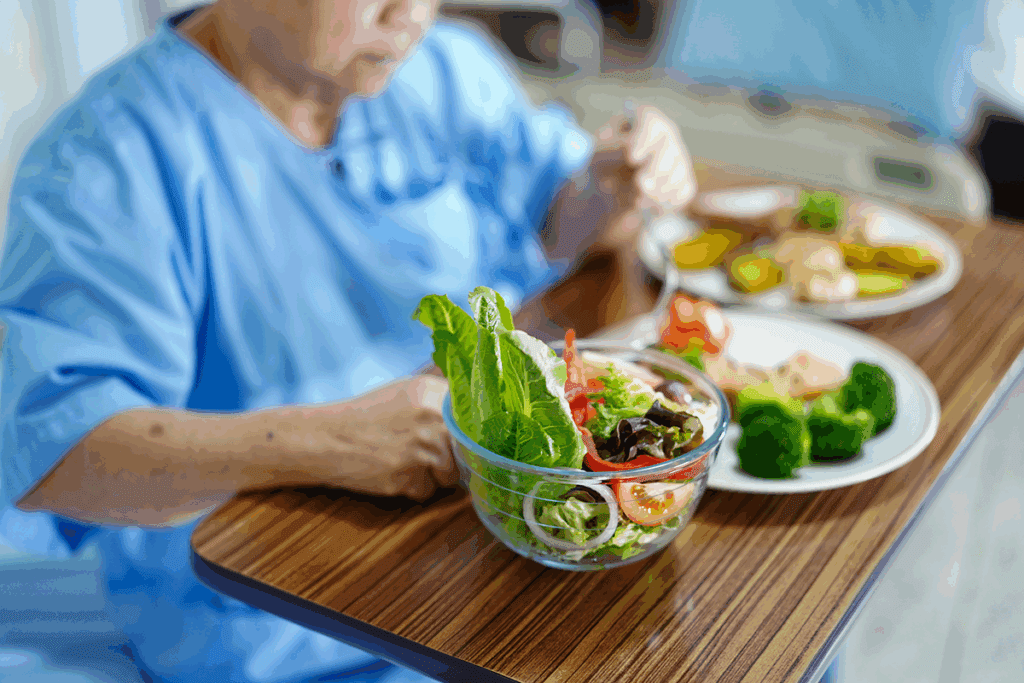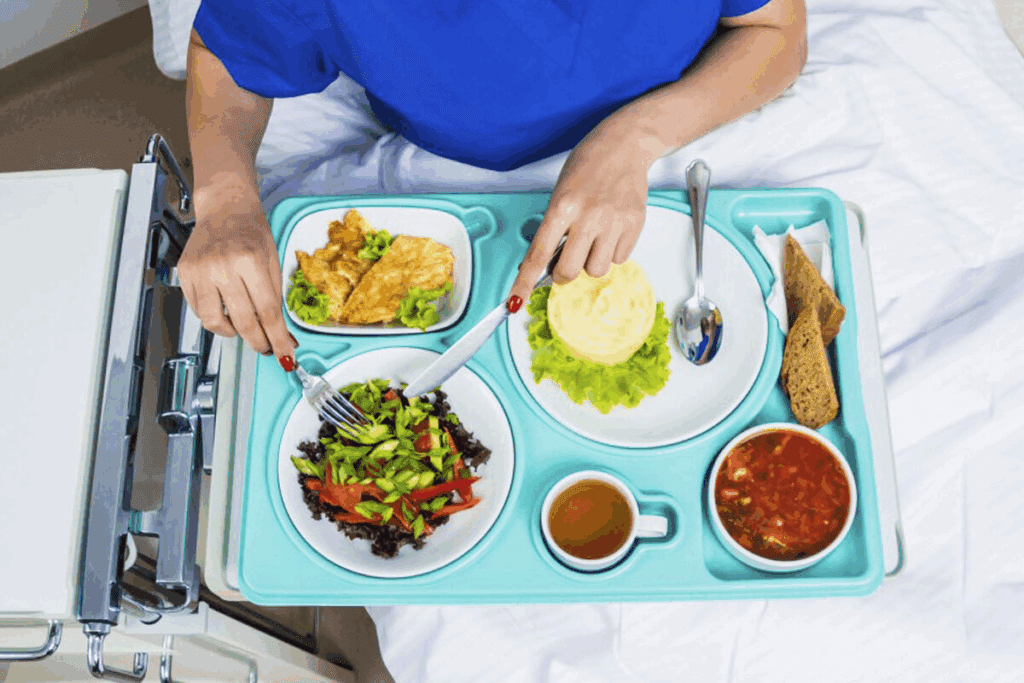Last Updated on November 26, 2025 by Bilal Hasdemir

Colon cancer is a big health worry, and diet is key in its fight. Some foods that cause colon cancer raise the risk, so knowing which ones to avoid is critical. Choosing the right foods is key to lowering colon cancer risk. Knowing how diet affects colon cancer helps people take steps to stay healthy. Liv Hospital’s focus on patient care shows how important it is to know which foods cause colon cancer can lead to this disease.

Research shows a strong link between diet and colorectal cancer. Diet is key in preventing and causing this disease.
Studies say 20 to 30 percent of colorectal cancer cases come from bad eating habits. This shows how big of an impact diet has on colon health.
A study in a well-known journal found diet plays a big role in colorectal cancer worldwide. Here are some key findings from that research.
| Dietary Factor | Estimated Contribution to Colorectal Cancer Cases |
| Low fruit and vegetable intake | 14% |
| High red and processed meat consumption | 21% |
| Low dietary fiber intake | 17% |
The gut microbiota is vital for colon health. What we eat greatly affects our gut bacteria. Eating too much processed food and not enough fiber can upset the balance, raising cancer risk.
Chronic inflammation in the colon can lead to colorectal cancer. Some foods can help or hurt inflammation. For example, omega-3s and antioxidants can reduce it, while saturated fats and sugars can make it worse.
It’s important to understand how diet, inflammation, and colorectal cancer are connected. This knowledge helps in finding ways to prevent the disease.

Research shows that some foods can increase the risk of colon cancer. This highlights the role of diet in preventing cancer. Studies have found certain foods that can lead to this disease.
Studies have shown a link between diet and colorectal cancer. Eating 76 grams of red or processed meat daily can raise the risk by 20%. Many studies have looked at how diet affects cancer rates.
These studies have found that some diets are better than others. For example, a diet full of fiber can lower cancer risk. But, diets heavy in processed and red meat can increase it.
It’s important to know how certain foods cause cancer. Foods high in processed meat contain harmful compounds. These compounds can turn into cancer-causing substances in our bodies.
Diet is a big factor in colon cancer, but it’s not the only one. Other factors include genetics, lifestyle, and environment. These all play a part in the disease.
“The interplay between genetic, lifestyle, and environmental factors contributes to the complex etiology of colon cancer, underscoring the need for a comprehensive approach to prevention.”
Understanding the science behind colon cancer can help us make better choices. We can eat right, stay active, and know about other risks. This can lower our chances of getting colon cancer.
The International Agency for Research on Cancer has found that processed meat is a carcinogen. This means it can cause colorectal cancer. Eating processed meats raises the risk of getting this cancer.
Meats like bacon, sausages, and deli meats are bad because of preservatives. These preservatives, nitrates and nitrites, can cause cancer when eaten a lot.
Nitrates and Nitrites: These are added to keep meat fresh and tasty. But, they can turn into harmful substances in our bodies.
Eating nitrates and nitrites can increase the risk of colorectal cancer. Research shows these substances can harm colon cells, leading to cancer.
It’s best to avoid processed meats, but limiting them can help. The American Cancer Society suggests eating less processed meat to lower cancer risk.
Guidelines for Consumption:
Knowing the dangers of processed meats and making smart food choices can lower the risk of colorectal cancer.
Recent studies have shown that red meat, cooked at high temperatures, may increase bowel cancer risk. This has led to a closer look at how diet affects colorectal health.
Cooking red meat at high temperatures can create harmful compounds. These compounds, called heterocyclic amines (HCAs) and polycyclic aromatic hydrocarbons (PAHs), are known to cause cancer. Grilling or barbecuing meat can make this problem worse because it involves direct heat and flames.
Cooking Methods to Avoid:
A study in the Journal of the National Cancer Institute found a link between eating well-done or grilled meat and colorectal cancer. Those who ate more of these meats had a higher risk than those who ate less or cooked their meat at lower temperatures.
Red meat has heme iron, which is good for the body but can also lead to cancer-causing compounds in the colon. Heme iron can help create harmful compounds and damage colonic cells.
“The presence of heme iron in red meat is a critical factor in understanding its carcinogenic (cancer-causing) nature. It affects the meat’s stability and the gut’s microbial environment.”
It’s important to limit red meat, but also to get enough protein. Good alternatives include poultry, fish, legumes, and plant-based proteins.
| Protein Source | Cancer Risk Association | Health Benefits |
| Red Meat | Higher risk of bowel cancer | Rich in iron and protein |
| Poultry | Lower risk when consumed without skin | Good source of lean protein |
| Fish | Generally lower risk; omega-3 fatty acids may offer protective benefits | Rich in omega-3 fatty acids and protein |
| Legumes | Lower risk; high fiber content | Rich in fiber, protein, and various nutrients |
Making smart choices about protein sources and cooking methods can help lower bowel cancer risk. This way, you can keep your diet balanced.
The modern diet is full of ultra-processed foods and packaged snacks. These pose a big risk to our colon health. They are made to taste good and be easy to eat, but they use cheap ingredients and artificial stuff.
Ultra-processed foods have preservatives, flavor enhancers, and colorants that harm our gut. Studies show these additives can mess with our gut bacteria. This can cause inflammation and might even lead to colon cancer.
Some artificial sweeteners can change our gut bacteria. This can mess with how we handle sugar and might lead to metabolic problems.
Ultra-processed foods have hidden ingredients that cause inflammation. These include refined sugars, unhealthy fats, and too much sodium. Eating these often can cause long-term inflammation, which is bad for colon cancer.
Eating too much processed food can also mean we miss out on important nutrients and fiber. This makes colon health problems worse.
But, there are better choices for our colon health. Here are some:
By picking whole, nutrient-rich foods, we can avoid harmful additives. This helps keep our colon healthy.
Sugar-sweetened drinks do more than just add calories. They deeply affect our colon health. Drinking these can lead to obesity and raise the risk of some cancers.
The link between these drinks and colon cancer is complex. It involves many factors. One key point is how sugar helps cancer cells grow.
Cancer cells need glucose for energy. Drinking lots of sugar can help them grow and spread. Studies show that eating too much sugar increases cancer risk, including colon cancer.
“The consumption of sugary drinks is a major risk factor for obesity and type 2 diabetes, both of which are linked to an increased risk of certain cancers.”
A study in a top medical journal found a strong link between sugary drinks and colon cancer risk. The exact reasons are being studied, but cutting down on sugar is good for health.
Being overweight is a big risk for many cancers, including colon cancer. Drinks with sugar help us gain weight because they have lots of calories but no nutrients. The link between sugar, obesity, and cancer is complex.
| Factor | Impact on Colon Cancer Risk |
| Sugar-Sweetened Beverages | Increases risk through obesity and direct metabolic effects |
| Obesity | Linked to increased inflammation and cancer cell growth |
| Physical Activity | Reduces risk through improved insulin sensitivity and reduced inflammation |
It’s important to pick the right drinks for our colon health. Water is best because it has no calories and helps our digestive system work right.
Switching to these healthier drinks can lower the risk of colon cancer and other health problems.
Fast food combines processed meats, high salt, and unhealthy fats. This mix increases the risk of colorectal cancer. It’s important to limit or avoid fast food to reduce cancer risk.
Fast food has several cancer risk factors. Processed meats like bacon and sausages contain nitrates and nitrites. These can form harmful compounds in the body. High salt can cause stomach problems and may increase cancer risk. Unhealthy fats, used in frying, can cause inflammation, a cancer precursor.
“The consumption of processed meat has been linked to an increased risk of colorectal cancer, with the International Agency for Research on Cancer classifying processed meat as carcinogenic to humans.”
Eating fast food often raises the risk of colorectal cancer. Regular fast food consumption means more exposure to harmful ingredients. Studies show that frequent fast food eaters face a higher risk of colorectal cancer than those who eat it less.
| Frequency of Fast Food Consumption | Relative Risk of Colorectal Cancer |
| Daily | High |
| Weekly | Moderate |
| Monthly | Low |
| Rarely | Very Low |
It’s hard to avoid fast food completely, but healthier choices can help. Choose grilled chicken or fish over processed meats. Opt for smaller portions and avoid fried foods. Pick salads or fruits instead of fries to reduce harmful ingredient exposure.
Being mindful of food choices and eating fast food less can lower colorectal cancer risk. It’s about making smart choices for better health and well-being.
Saturated and animal fats are found in many foods. They are bad for the heart and can harm the colon. These fats can cause inflammation and affect how colon cells work.
Eating too much of these fats can cause chronic inflammation. This inflammation is a risk for diseases like colon cancer. The inflammation happens when these fats are broken down, releasing harmful compounds.
Key factors contributing to inflammation include:
The breakdown of saturated and animal fats can harm colon cells. They produce secondary bile acids, which damage cells and can lead to cancer.
“A diet high in saturated fats can alter the gut microbiota, leading to changes in the way colon cells function and potentially increasing the risk of colon cancer.”
There are healthier fats than saturated and animal fats. Plant-based fats, like those in avocados, nuts, and olive oil, are good for the heart and colon.
Some beneficial plant-based fats include:
Choosing these plant-based fats can help reduce harmful fats. This can lower the risk of colon health problems.
After getting a colorectal cancer diagnosis, knowing which foods to avoid is key. It helps with treatment and improves your health. Making smart food choices is part of managing the disease.
People with colorectal cancer should make some dietary changes. Eating foods rich in nutrients is important. Avoiding foods that can make symptoms worse is also key.
Some drinks can upset your stomach or mess with treatment. Alcohol can lead to more problems and should be cut down or stopped. Caffeine and carbonated drinks can also cause issues and should be used carefully.
Getting help from a nutritionist or healthcare team is very helpful. They can make a diet plan just for you. This plan helps with side effects, makes sure you get enough nutrients, and keeps you healthy.
By choosing the right foods and getting help from health experts, you can manage your colorectal cancer better. This improves your life quality.
Eating whole grains, fruits, and vegetables can lower colon cancer risk. Knowing which foods increase this risk is key to good eating habits.
Studies link high processed meat, red meat, and saturated fats to colon cancer. Cutting down on these foods helps keep your colon healthy.
For a lower cancer risk, eat foods high in fiber, lean proteins, and healthy fats. Avoiding certain foods is also important for colon health.
Choosing the right foods and living healthily can greatly reduce colon cancer risk. This supports your colon’s overall health.
Foods like processed meats, red meat, and ultra-processed foods can increase colon cancer risk. Also, sugar-sweetened drinks and foods high in animal fats are bad for your colon health.
Processed meats have nitrates and nitrites. These can turn into harmful compounds when mixed with amino acids. This increases the risk of colon cancer.
Red meat, when cooked at high temperatures, can contain harmful compounds. These compounds, like PAHs and HCAs, may raise the risk of bowel cancer.
Ultra-processed foods often have artificial additives and unhealthy fats. These can cause inflammation and harm your gut microbiota. This may increase the risk of colon cancer.
High sugar intake, like in sugar-sweetened drinks, can lead to insulin resistance and obesity. These conditions can cause chronic inflammation, raising the risk of colon cancer.
After a colorectal cancer diagnosis, it’s best to avoid foods that can worsen symptoms or interact with treatment. This includes alcohol, caffeine, and carbonated drinks.
Cooking at high temperatures, like grilling or frying, can create harmful compounds. Lower-heat methods, such as steaming or baking, are safer for your colon health.
Yes, a diet rich in fiber, vitamins, and minerals from plant-based sources can support colon health. This may help reduce the risk of colon cancer.
Personalized nutrition plans are very important for colon cancer patients. Working with a healthcare professional or registered dietitian can help manage symptoms and support overall health.
Yes, making smart dietary choices can greatly impact your colon health. It can reduce the risk of colon cancer, as diet is a changeable risk factor.
Centers for Disease Control and Prevention. (2023). Colorectal cancer risk factors. https://www.cdc.gov/cancer/colorectal/basic_info/risk_factors.htm
Subscribe to our e-newsletter to stay informed about the latest innovations in the world of health and exclusive offers!